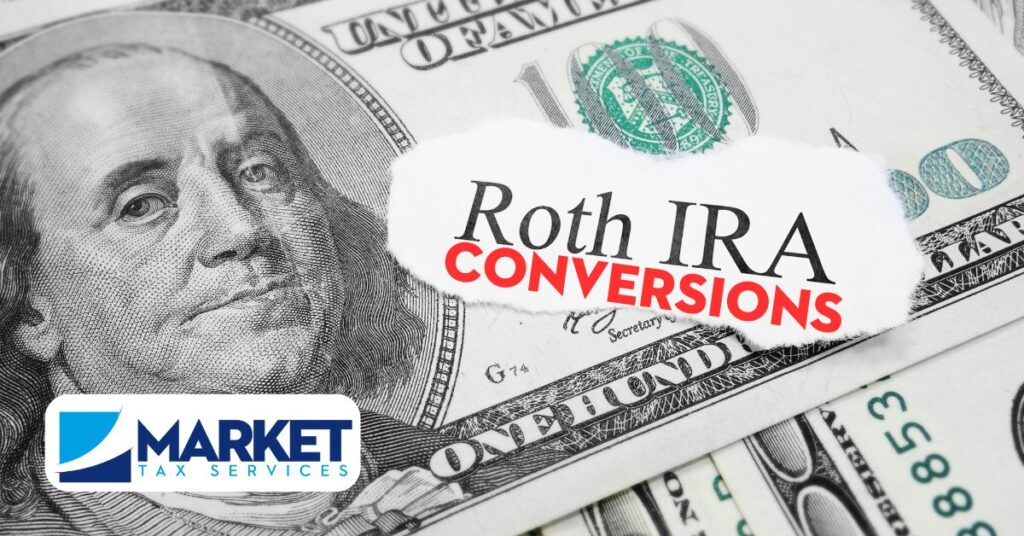
For many Americans, there comes a time when a Roth conversion is the right move to make. Transferring assets from one retirement account to a Roth IRA can be a decision filled with questions – like how big your Roth conversion should be. We’ll cover that in this article.
There are no limits on the amount you can convert to a Roth IRA, and you can convert as much of your pre-tax retirement money as you want. The only limiting factor is the taxes you will have to pay. This means that you need to consider the following factors, as different conversion amounts will have varying tax impacts.
We’ve identified six factors that one should consider when looking at a Roth conversion.
#1 – Your Tax Bracket
Since the conversion amount is your income for the year, it could push you into a higher tax bracket. If you want to stay in the same tax bracket, calculate the conversion amount to see if it exceeds the current tax bracket limit. For example, if a single taxpayer is currently in the 24% tax bracket, the top limit of this tax bracket is $182,100. If your taxable income is $100,000 before conversion, then you can convert up to $82,100 to keep you in the same tax bracket.
#2 – Your Future Tax Rate
If you expect your tax rates will be higher in retirement, you will benefit from conversion now when you pay lower rates.
#3 – Required Minimum Distributions (RMDs)
Roth IRAs do not have RMDs, and a Roth conversion reduces your future RMDs. When deciding how much to convert, consider how the income from RMDs will impact your tax situation. The “common wisdom” for years was to defer the taxation on your retirement accounts, however now many retirees are seeing their income (and taxes) dramatically increasing in their retirement years. Many times, these retirees are paying more in taxes in retirement than when they were working. If your expected RMD’s will force you to take more income than you need, you can convert your portions of your traditional IRAs and not worry about the tax consequences from those RMDs.
#4 – State Income Tax
Since a Roth conversion is a taxable event, you will need to pay state income tax. If you are planning to move to another state, consider your future state’s tax rate whether it is higher, lower, or no state tax.
For the full list of state income tax amounts, click here.
#5 – The 3.8% net investment income tax and IRMAA
The amount converted to a Roth account will increase your income, and it may move you above the tax threshold. This may cause you to pay the net investment income tax on your investment income. Also, the higher income can push you into a higher IRMAA bracket which can increase the Medicare Part B and D premiums. Both of these issues are some of the unintended consequences of doing a Roth conversion without walking through all of the impacts of those decisions. Be sure to review to decide the amount of conversion. That’s why another benefit of working with us on your retirement planning is Market Medicare Advisors, located in the same facilities as Market Tax Services and Market Advisory Group (financials).
#6 – Cost and Overall Financial Planning
After you complete a Roth conversion, how will you pay the taxes? The conversion incurs taxes on the converted amount, meaning: the larger the conversion, the greater the taxes. Did you have taxes withheld from the conversion? Did you make an estimated payment? Failing to make a payment when the conversion is done will cause you to owe more taxes when your return is filed and might even incur penalties. It is important to review your overall financial situation to decide the conversion amount and ensure you have funds available to pay these taxes.
Conclusion
While relatively simple in concept, executing a Roth conversion has many factors that should influence your decision-making process. Are you working with a team of advisors who can help you not only do a Roth conversion, but also understand all the consequences that go along with the transaction? When you are ready, please feel free to schedule a consultation with our team of tax professionals. We can help you determine if a Roth conversion is necessary, identify the appropriate conversion amount, and help you work with a financial advisor to determine how the converted funds should be invested.
